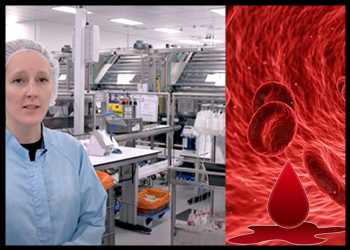Lab-grown Blood Transfused Into Human Being In World’s First Clinical Trial

Laboratory-grown blood has been transfused into a human being in a world’s first clinical trial.
The manufactured blood cells were grown from stem cells from donors. Around 5-10 mls, or about one to two teaspoonfuls of red cells were then transfused into volunteers in the randomized controlled clinical trial.
The RESTORE trial is a joint research initiative by NHS Blood and Transplant (NHSBT) and the University of Bristol, working with the University of Cambridge, Guy’s and St Thomas’ NHS Foundation Trust, National Institute for Health and Care Research (NIHR) Cambridge Clinical Research Facility, and Cambridge University Hospitals NHS Foundation Trust.
This is the first time in the world that red blood cells grown in a laboratory have been given to another person as part of a trial into blood transfusion.
If proved safe and effective, manufactured blood cells could revolutionize treatments for people with blood disorders such as sickle cell and rare blood types. It can be difficult to find enough well-matched donated blood for some people with these disorders.
The ultimate aim of this research project is to manufacture vital, but very rare blood groups that are difficult to get.
The trial is studying the lifespan of the lab grown cells compared with infusions of standard red blood cells from the same donor. The lab-grown blood cells are all fresh, so the trial team expects them to perform better than a similar transfusion of standard donated red cells, which contains cells of varying ages.
Additionally, if manufactured cells last longer in the body, patients who regularly need blood may not need transfusions as often. That would reduce iron overload from frequent blood transfusions, which can lead to serious complications.
For the foreseeable future, manufactured cells could only be used for a very small number of patients with very complex transfusions needs.
Two people have so far been transfused with the lab grown red cells. They were closely monitored and no side effects were reported, NHS Blood and Transplant said. They are well and healthy. Their identities are undisclosed.
A minimum of 10 participants will receive two mini transfusions at least four months apart, one of standard donated red cells and one of lab grown red cells, to find out if the young red blood cells made in the laboratory last longer than cells made in the body.
Further trials are needed before clinical use, but this research marks a significant step in using lab grown red blood cells to improve treatment for patients with rare blood types or people with complex transfusion needs.
Source: Read Full Article
